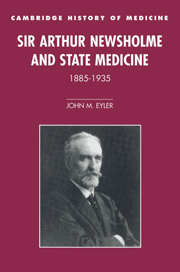Book contents
- Frontmatter
- Contents
- Illustrations
- Preface
- Abbreviations
- PART I THE MEDICAL OFFICER OF HEALTH AND THE LOCAL SANITARY AUTHORITY
- 1 The Medical Officer of Health and his town
- 2 Fact, theory, and the epidemic milieu
- 3 The urban environment and the M.O.H.'s authority
- 4 The municipal hospital and the isolation of acute infectious diseases
- 5 The epidemiology of infected food and the limits of sanitary jurisdiction
- 6 Tuberculosis: Public policy and epidemiology
- PART II NEWSHOLME AT THE LOCAL GOVERNMENT BOARD
- PART III THE OLD WORLD AND THE NEW: NEWSHOLME AS ELDER STATESMAN
- Select bibliography
- Index
- Titles in the series
6 - Tuberculosis: Public policy and epidemiology
Published online by Cambridge University Press: 04 December 2009
- Frontmatter
- Contents
- Illustrations
- Preface
- Abbreviations
- PART I THE MEDICAL OFFICER OF HEALTH AND THE LOCAL SANITARY AUTHORITY
- 1 The Medical Officer of Health and his town
- 2 Fact, theory, and the epidemic milieu
- 3 The urban environment and the M.O.H.'s authority
- 4 The municipal hospital and the isolation of acute infectious diseases
- 5 The epidemiology of infected food and the limits of sanitary jurisdiction
- 6 Tuberculosis: Public policy and epidemiology
- PART II NEWSHOLME AT THE LOCAL GOVERNMENT BOARD
- PART III THE OLD WORLD AND THE NEW: NEWSHOLME AS ELDER STATESMAN
- Select bibliography
- Index
- Titles in the series
Summary
ADMINISTRATION
No other aspect of Newsholme's activities in Brighton gave him as much personal satisfaction or added so significantly to his professional reputation as his work with tuberculosis. His success in Brighton in constructing a comprehensive preventive strategy brought him attention outside the world of public health administration and helped win him the Medical Officership of the Local Government Board. In turn the use he made in Whitehall of this local experience offers historians a good example of the influence of municipal experiments on the nation's health policy. In retrospect it is easy to find a logic in the successive administrative changes that created Brighton's tuberculosis policy. But the historical evidence suggests that Newsholme began his work against tuberculosis with no master plan. Rather, we find that over a period of nearly two decades a policy slowly emerged in response to administrative experience and changing medical ideas. In this process we find operating at two levels an interplay between epidemiological studies on the one hand and his policy recommendations on the other. At the local level, through case finding and efforts to trace infection through the community as he had done for scarlet fever, his epidemiology helped shape his policy. On a grander scale of explanation, however, his policy experience helped determine the design and the outcome of his epidemiological studies. The former work won him nearly universal respect from his professional peers. Although he put great stock in the second class of investigations, and although they were influential in some quarters, these studies, pursued so vigorously over a number of years, involved him in protracted and bitter controversy and failed to convince even some of his friends.
- Type
- Chapter
- Information
- Sir Arthur Newsholme and State Medicine, 1885–1935 , pp. 142 - 192Publisher: Cambridge University PressPrint publication year: 1997



